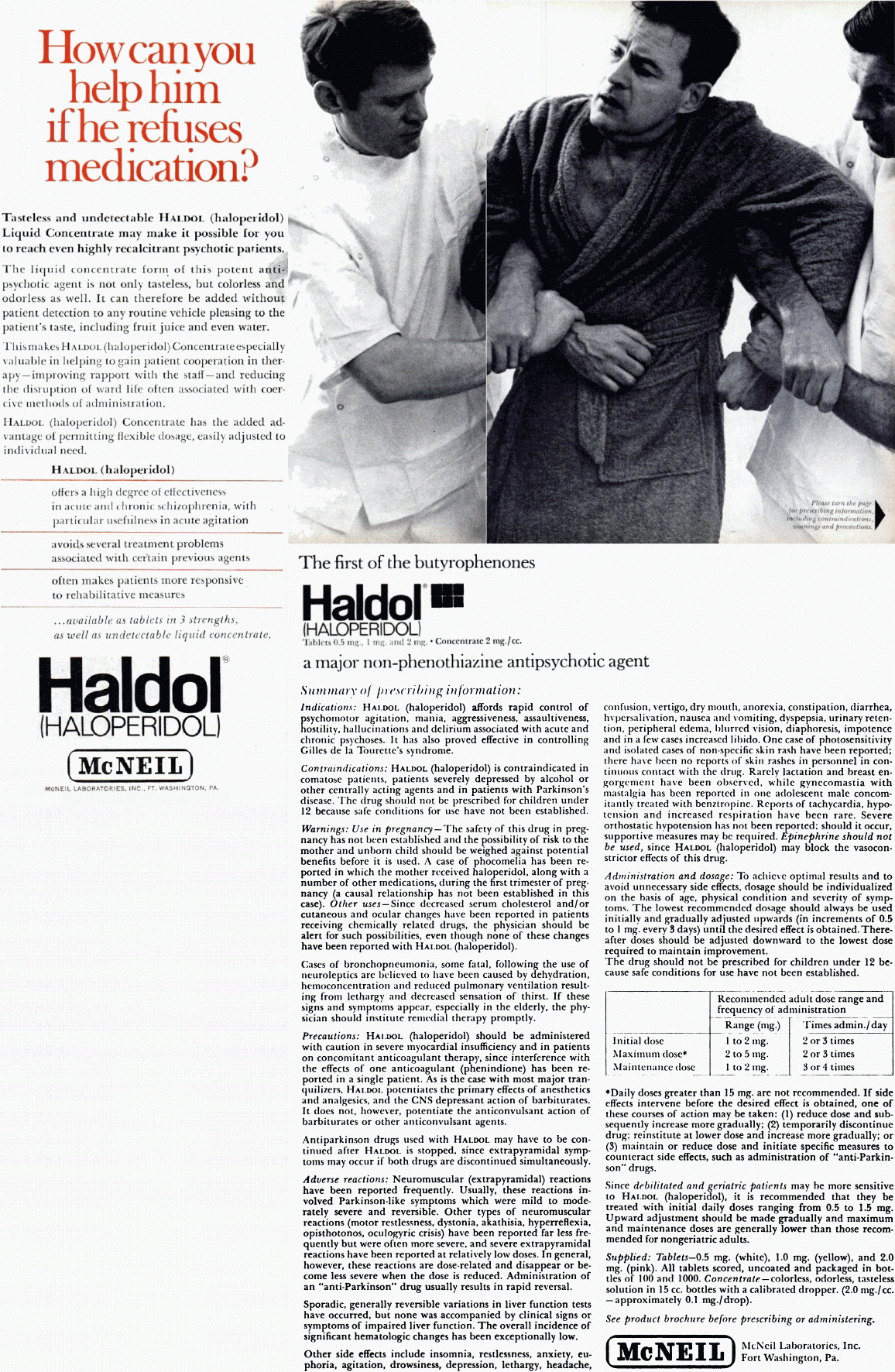

|
|
Haldol advertisement, 1968. Hospital & Community Psychiatry, Vol. 19, No. 5. How can you help him if he refuses medication? Tasteless and undetectable HALDOL (haloperidol) Liquid Concentrate may make it possible for you to reach even highly recalcitrant psychotic patients. The liquid concentrate form of this potent antipsychotic agent is not only tasteless, but colorless and odorless as well. It can therefore be added without patient detection to any routine vehicle pleasing to the patient's taste, including fruit juice and even water. This makes Haldol (haloperidol) Concentrate especially valuable in helping to gain patient cooperation in therapy -- improving rapport with the staff -- and reducing the disruption of ward life often associated with coercive methods of administration. Haldol (haloperidol) Concentrate has the added advantage of permitting flexible dosage, easily adjusted to individual need. Haldol (haloperidol) * offers a high degree of effectiveness in acute and chronic schizophrenia, with particular usefulness in acute agitation * avoids several treatment problems associated with certain previous agents * often makes patients more responsive to rehabilitative measures ... available as tablets in 3 strengths, as well as undetectable liquid concentrate. HALDOL® (haloperidol) ~ The first of the butyrophenones ~ a major non-phenothiazine antipsychotic agent Summary of prescribing information: Indications: Haldol (haloperidol) affords rapid control of psychomotor agitation, mania, aggressiveness, assaultiveness, hostility, hallucinations and delirium associated with acute and chronic psychoses. It has also proved effective in controlling Gilles de la Tourette's syndrome. Precautions: Haldol (haloperidol) should be administered with caution in severe myocardial insufficiency and in patients on concomitant anticoagulant therapy, since interference with the effects of one anticoagulant (phenindione) has been reported in a single patient. As is the case with most major tranquilizers, Haldol potentiates the primary effects of anesthetics and analgesics, and the CNS depressant action of barbiturates. It does not, however, potentiate the anticonvulsant action of barbiturates or other anuconvulsant agents. Antiparkinson drugs used with Haldol may have to be continued after Haldol is stopped, since extrapyramidal symptoms may occur if both drugs are discontinued simultaneously. Adverse reactions: Neuromuscular (extrapyramidal) reactions have been reported frequently. Usually, these reactions involved Parkinson-like symptoms which were mild to moderately severe and reversible. Other types of neuromuscular reactions (motor restlessness, dystonia, akathisia, hyperreflexia, opisthotonos, oculogyric crisis) have been reported far less frequently but were often more severe, and severe extrapyramidal reactions have been reported at relatively low doses. In general, however, these reactions are dose-related and disappear or become less severe when the dose is reduced. Administration of an "anti-Parkinson" drug usually results in rapid reversal... See product brochure before prescribing or administering. McNEIL ~ McNeil Laboratories, Inc., Ft. Washington, PA. |